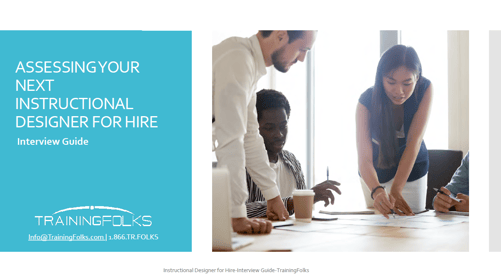Instructional Design: Skills List for your next Training Hire

Planning a training session can be a daunting task. Not only do you need to ensure that your message is captured and delivered correctly to convey your message, but you also want to ensure that the learners have listened and understood.
Learners who participate in your training course will need to have an idea of the expectations ahead, as well as the skills that are required to meet those expectations. With recruits coming from many walks of life, the burden of delivering consistently superb educational outcomes is daunting.
Hiring a top-notch Instructional Designer for your curriculum and educational processes can be tricky. It begins with a thorough understanding of the top Instructional Design skills list.
Skills an Instructional Designer should have
A first step in any learning program is to explore the skills required to get the job done. Some of the top skills to look for in an Instructional Designer are:
-
Creativity
-
Communication Skills
-
Research Skills
-
People Skills
-
Time Management
-
Flexibility
I. Creativity
Now more than ever, business must be able to adapt and change quickly. We adapt by thinking broadly to find formerly unexplored possible solutions to our problems.
Look at your prospective hire’s portfolio for examples of:
-
Connecting unrelated elements to generate novel expressions
-
Altering context, levels of scale, or other elements to manifest impact
-
Triggering emotional sentiment and a sense of connection
A designer with strong examples of these and other forms of broad lateral thinking will be instrumental in developing a strong curriculum for your training program.
II. Communication Skills
Of all the critical skills in an Instructional Designers tool kit, this may be the most important. Everything else revolves around communication. You will want to verify that your prospective hire can effectively communicate both in writing and verbally.
This can include:
Appropriate Voice
They will need to adapt their voice and tone to all participants. Do they understand your audience? Does your prospective hire know how to adapt their language to your specific audience?
Thorough Breakdowns
Can this Designer take a complex idea and break it down into its subsequent parts, boiling down each idea to its simplest components? This is an important step in teaching others.
Relevant Examples
In order to convey these simple ideas, and make them memorable, the Instructional Designer should demonstrate that they can put the ideas into their proper context with examples suited to the audience.
Clear Explanations
Once the ideas are boiled down to their smallest parts and examples are provided, the concepts will have to be labeled. Can this Designer learn the lingo of your industry and apply the terminology with consistency?
III. Research Skills
Information is readily available from thousands of sources. But strong research skills go beyond finding information. Can they weed out the fluff and find meaningful sources of reliable data? How do they handle their own assumptions and yours?
Bias and Poor Thinking
Can your designer spot biases in the source materials. Do they filter out what cannot be used and clearly see what can? Can they explain the difference?
A Sense for What Matters
In this age of abundant information, not every available fact that seems relevant is a necessary consideration for your current objectives. Your prospective Designer should know the questions to ask your management to understand your objectives perfectly. They should be able to scrutinize data to see what information is relevant for your desired educational outcomes.
IV. People Skills
While your Designer may be working alone, they will need to take direction and solicit feedback from members or your team. You’ll want to know that they can establish and maintain open channels of communication that encourage others to ask questions, challenge ideas, and collaborate freely. Ask your prospective hire to explain how they maintain safety and respect in conversations and how they keep focus on the common goal.
Establishing Safety and Respect
Safety and respect are the elements that allow a group to disagree productively. Ask your prospective hire how they will ensure that these elements are maintained when collaborators start to get attached to their ideas and take sides.
Keeping Focus on the Common Goal
Frequently, things fall apart when factions form, and people are focusing on getting their way — rather than focusing on the central goal defined and agreed upon at the beginning of a project. How does your prospective hire intend to ensure that the team will maintain that focus?
Time Management Skills
Let’s face it, your business is on a schedule. You have to ship. You have to meet deadlines. Your new training processes are no exception. An Instructional Designer who can execute with measured efficiency is essential.
So, how do you tell who has the time management skills to meet your needs?
Examine their Portfolio
Look through their past projects to see if they have been consistently completing projects on time. A Designer who consistently works on smaller projects may not have a process sufficient to handle your scope of work.
Inquire about their Process
The process they describe will show that they intend to complete the broad brush strokes before they begin filling in the details. If their process doesn’t move from the macro of the project to the micro then you may be left in a lurch due to time constraints.
Ask about their Methods of Collaboration
It is advantageous to find out how your prospective Designer will delegate tasks and rely on the expertise of others. Are they coming in with an idea of how to use your existing resources? A seasoned Instructional Designer will know what they need of you and will likely have some preferences concerning communication frequency.
When accounting for time management, a prospect that has consistently delivered similar work, who knows how to get the big things finished before the details, and who is clear about how to integrate into established human resources is a good bet.
V. Flexibility
Your ideal Designer will be inspired by challenges like making what was planned as a live educational experience into an online one, or collaborating with your executive team to develop new training materials as your work environments change to accommodate new best practices and regulations.
These are a few of the important skills of an Instructional Designer. For additional skills, download our FREE eBook below. These can help when assessing your next Instructional Designer for hire.
Need help finding the right Instructional Designer for your next training session?
Contact the experts at TrainingFolks!
Get our FREE eBook download:
'Assessing Your Next Instructional Designer for Hire' Interview Guide.


